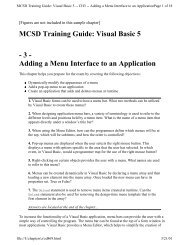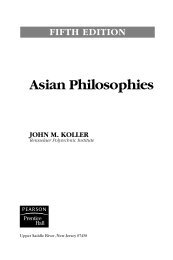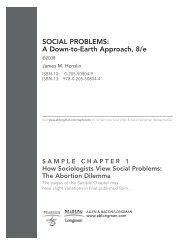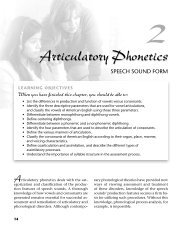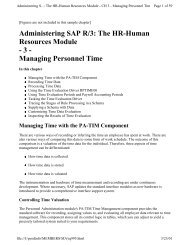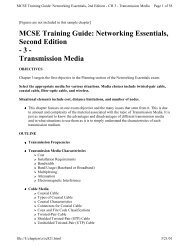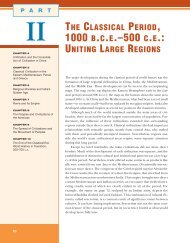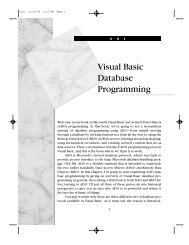CULTURE, language, AND COGNITION
CULTURE, language, AND COGNITION
CULTURE, language, AND COGNITION
Create successful ePaper yourself
Turn your PDF publications into a flip-book with our unique Google optimized e-Paper software.
GA305c05.qxd 4/30/2004 11:26 AM Page 122<br />
122 culture, Language, and cognition<br />
consistent across the lifespan. Despite these findings, there is the pervasive<br />
stereotype that older people are impaired in their communication. Ryan,<br />
Giles, Bartolucci, and Henwood (1986) suggest that the ability of older people<br />
to communicate is influenced by several interacting factors. In a society<br />
in which aging is associated with negative expectations, older adults are<br />
faced with a “communication predicament”: physical changes of aging (e.g.,<br />
hearing loss, voice quality, slowness of movement) are interpreted by others<br />
as loss of competence. As a consequence, caregivers and others communicate<br />
with the older person in a simplistic and patronizing way. This in turn leads<br />
to diminished self-esteem, social withdrawal, and, ultimately, to a decline in<br />
communicative competence. Here, negative cultural expectations actually<br />
lead to a self-fulfilling prophecy. Consider, once again, the ecological systems<br />
approach. Although scientific evidence is lacking, it is conceivable that older<br />
adults in cultures that hold their elders in higher esteem will not experience<br />
the communication predicament described above.<br />
Just as cultural expectations differ in important ways, so do <strong>language</strong>s.<br />
Perhaps aging affects speakers of different <strong>language</strong>s in different ways. Although<br />
research on cross-<strong>language</strong> differences and aging is sparse to date,<br />
Kemper (1992) shares a few interesting observations. Some <strong>language</strong>s are<br />
very strict in their structure. For example, English has a fixed word order of<br />
subject–verb–object. Other <strong>language</strong>s, such as Russian and informally spoken<br />
Japanese, rely heavily on contextual cues and word order may vary. Kemper<br />
points out that the more “contextual” <strong>language</strong>s may make it easier for older<br />
people to comprehend and speak because they do not have to follow complex,<br />
strict <strong>language</strong> rules. This means that older adults who may have problems<br />
processing complex sentence structure can still understand and convey<br />
the meaning of a spoken sentence by interpreting the larger context.<br />
� Summary<br />
Cognition is a general term referring to thinking, reasoning, decision making,<br />
remembering, categorizing, and problem solving. Cultural factors and beliefs<br />
found in the interaction among Bronfenbrenner’s ecological systems, the developmental<br />
niche, and the sociocultural orientation contribute in a variety<br />
of ways to cognitive development across the lifespan.<br />
The theories of Piaget, Vygotsky, and others provide a useful framework<br />
for conceptualizing cognitive growth and development and its relationship<br />
to <strong>language</strong> and culture. The linguistic relativity hypothesis states that<br />
different <strong>language</strong>s provide us with different frameworks within which we<br />
understand and communicate our experiences.<br />
Vygotsky’s sociocultural theory emphasizes the strong influence of social<br />
and cultural factors on both cognitive and <strong>language</strong> development. He introduced<br />
the zone of proximal development, which refers to what a child is





